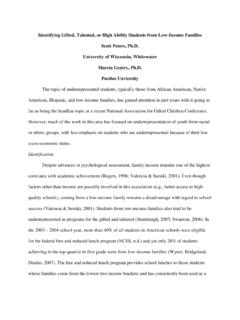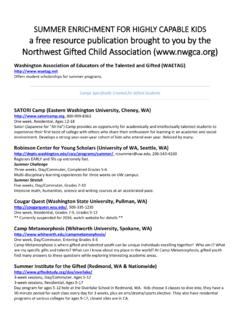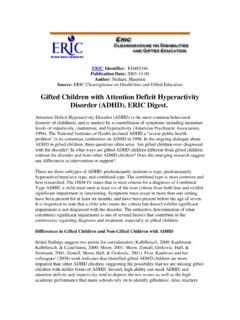Transcription of The 2018 Hormel Foundation Gifted and Talented …
1 The 2018 Hormel Foundation Gifted and Talented Education Symposium Session Descriptions (Listed Alphabetically by Presenter) Each three-day session will meet on Tuesday, Wednesday, and Thursday. Participants should select one session per time slot and attend that session all three days. See the session grid in the program book for the time and location of each session. BOSWELL, CECELIA Educational Consultant, Austin Creek Education systems/Texas Association of Gifted and Talented , De Leon, Texas Case Studies in Differentiated Instruction Exploration of differentiated instruction in authentic situations offers in-depth understanding of this topic. This session focuses on case studies with an exchange of ideas, strategies, and current practices that support standards of excellence.
2 Investigate a variety of case studies illustrating differentiation for Gifted learners and examine your own ideas about appropriate differentiation for the Gifted classroom. Case studies of differentiated instructional strategies relevant to your students will be explored each day. Together, we will analyze cases through discussion questions that reflect best practice for Gifted learners. Our goal is to draw from these case studies situated in authentic and meaningful contexts in order to improve services for your Gifted and Talented students. Intended Audience: K-12 Teachers, Gifted and Talented Coordinators and Specialists, Instructional Coaches, Principals, School Board Members Leadership: Building Intentional Leadership in Gifted Learners Leadership is a hot topic.
3 Many educators assume Gifted students possess leadership strengths and expect them to lead naturally. As with any potentiality, Gifted abilities in leadership require intentional development. Explore a new concept for leadership that offers Gifted students four leadership frames to guide them toward becoming effective leaders. This session presents a new approach to leadership through leader stories and interactive strategies to reframe or look at leadership from different perspectives. You will develop a conceptual understanding of four frames of leadership and use interactive activities to investigate a new this approach to leadership in Gifted learners. You will analyze your own natural leadership tendencies, practice activities to develop this new concept of leadership capacity for yourself and your students, and enhance your understanding of reframing toward becoming an intentional leader.
4 Intended Audience: 4-12 Teachers, Gifted and Talented Coordinators and Specialists, Instructional Coaches, Principals, School Board Members, Integration Specialists and Success Coaches, Out of School Service Providers CHAMBERLIN, SCOTT University of Wyoming - Laramie, Wyoming Optimizing environmental factors that facilitate creative output in elementary classrooms Creating the right environment for facilitating creative output in the elementary mathematics classroom is crucial and GT students are often the group of students most likely to exhibit creative products. Having never been exposed to such a discussion, many (beginning to veteran) educators are at a disadvantage in how to create such an environment. In this multi-session experience, the focus in on tactics that teachers can utilize to enhance the likelihood that creative products emerge from students of various abilities in mathematics.
5 In specific, creating an ideal atmosphere, when considering student affect (feelings, emotions, and dispositions) is given considerable attention. Intended Audience: K- 6 Teachers, Gifted and Talented Coordinators and Specialists, Curriculum Directors, Instructional Coaches, Out of School Program Providers, and Home-school Parents Utilizing curricula to precipitate creative output in middle grade and junior high mathematics classrooms A discussion of curricular approaches that facilitate creative thinking in the middle school/junior high mathematics classroom is the emphasis in these sessions. Specifically, there are various factors involved in eliciting creative output in mathematics and educators have some control relative to the extent of creative output among GT students.
6 A critical factor involved in creativity rests in the curricular approaches used to challenge students. Hence, being able to carefully choose a curriculum designed to precipitate such thought and output in a classroom or out of school setting may enhance the likelihood of creative products emerging. In these sessions, participants will explore curricula and components of problem types that facilitate creativity. Intended Audience: 4-8 Teachers, Gifted and Talented Coordinators and Specialists, Out of School Program Providers, Instructional Coaches, Curriculum Directors and Specialists, Administrators, and Home-school Parents DAILEY, DEB University of Central Arkansas - Conway, Arkansas Engineering Instruction for High Ability Learners in K-8 Classrooms Due to time and scheduling constraints in most classrooms, including Gifted classrooms, many teachers are turning to an integrative STEM approach to learning.
7 Through the lens of problem solving and engineering design, teachers can seamlessly integrate multiple subjects while addressing multiple content standards. Through this integrated approach, learning takes place as students are actively engaged in authentic tasks while addressing real-world problems. Through this approach, students problem solve using the engineering design process, build science content knowledge by doing science , utilize real-world mathematics in building and evaluating models, and read informative texts and write proposals, summaries, and conclusions as they practice literacy skills. Participants in this session will actively engage in an engineering focused-integrated unit addressing content standards in science, mathematics, language arts, and social studies.
8 Intended Audience: K-8 Teachers, Gifted and Talented Coordinators and Specialists, Instructional Coaches, Curriculum Coordinators and Directors, Out of School Service Providers, Integration Specialists and Success Coaches Hands-on Science for Advanced Learners To prepare our next generation innovators, advanced learners need opportunities to explore science and be wowed by the possibilities. With the release of the Next Generation Science Standards (NGSS), efforts are being made to improve science instruction and provide students early opportunities to engage students in the practices of science and engineering. To increase investigative and hands-on opportunities, this session will focus on using available, free technology to increase student engagement in STEM subjects.
9 For example, augmented reality allows students to explore the solar system, anatomy, and our environment without leaving the classroom. Digital design allows students to create a prototype for their problem or project based learning unit as they further develop their spatial skills. Intended Audience: K-8 Teachers, Gifted and Talented Coordinators and Specialists, Instructional Coaches, Curriculum Coordinators and Directors, Technology Coordinators, Integration and Success Coaches, Out of School Service Providers DRAPEAU, PATTI Educational Consultant South Freeport, Maine Wrapping Your Curriculum around a Non-Digital Game Framework If you are looking for a way to entice your students to engage in rigorous curriculum, look no further.
10 Imagine creating a game that provides cognitive demands and requires students to work in teams to solve a mystery. The structure of the game focuses on game thinking and turns your most mundane cognitive tasks into something engaging and even competitive. It s a matter of reframing challenging assignments into tasks. As students complete tasks, they receive clues and strategy cards to help solve the mystery. In these interactive sessions, participants will receive directions on how to create a mystery game, review samples of teacher created field-tested mystery games, engage in specific strategies to use in order to create rigorous tasks, and preview gaming resources. Intended Audience: 3-12 Teachers, Gifted and Talented Coordinators and Specialists, Instructional Coaches, Administrators, Out of School Service Providers Critical and Creative Thinking in the ELA Classroom Today s students are expected to make judgments, find evidence, infer and synthesize information.







